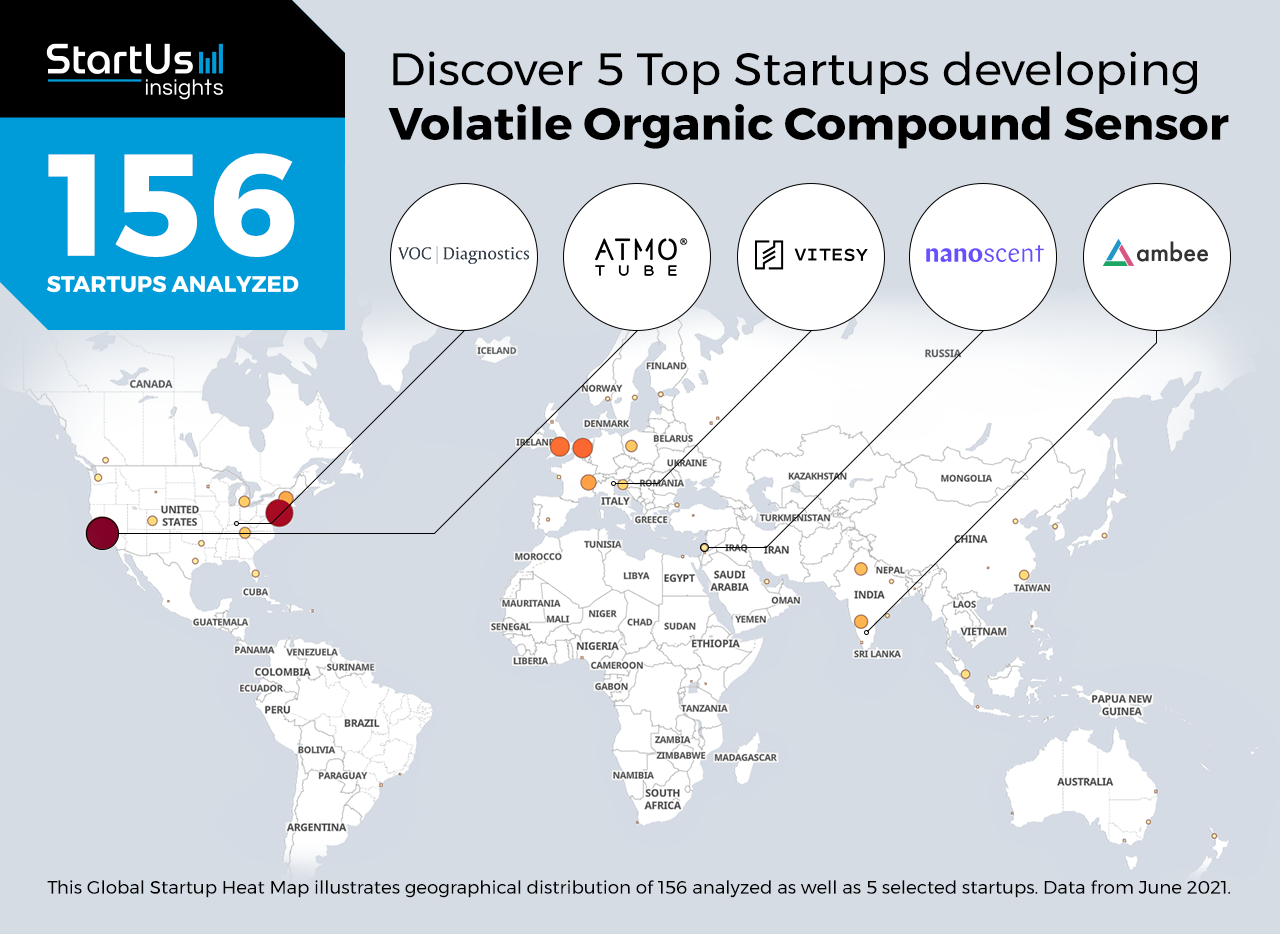Staying ahead of the technology curve means strengthening your competitive advantage. That is why we give you data-driven innovation insights. This time, you get to discover 5 hand-picked startups developing volatile organic compound (VOC) sensors.
Global Startup Heat Map highlights 5 Top Startups developing Volatile Organic Compound Sensors out of 156
The insights of this data-driven analysis are derived from the Big Data & Artificial Intelligence-powered StartUs Insights Discovery Platform, covering 2.093.000+ startups & scaleups globally. The platform gives you an exhaustive overview of emerging technologies & relevant startups within a specific field in just a few clicks.
The Global Startup Heat Map below reveals the distribution of the 156 exemplary startups & scaleups we analyzed for this research. Further, it highlights 5 startups that we hand-picked based on criteria such as founding year, location, funding raised, and more. You get to explore the solutions of these 5 startups & scaleups in this report. For insights on the other 151 startups developing volatile organic compound sensors, get in touch.
VOC Diagnostics provides Ovarian Cancer Detection
Ovarian cancer is one of the most commonly occurring cancers among women and affects a large number of women worldwide. However, it is hard to detect in its early stages. This makes ovarian cancer treatment difficult as most cancers are detected at advanced stages. To enable early detection of ovarian cancer, startups are measuring the VOCs in blood samples.
US-based startup VOC Diagnostics develops VOC technology to detect ovarian cancer through smell in blood samples. The startup’s instrument detects specific VOCs from a blood sample, the compounds of which are measured and analyzed through an advanced algorithm in a short duration. The technology is supported by years of research which shows that human ovarian cancer is surrounded by a specific odor that is organ-specific. Besides, the findings are that VOCs from ovarian cancer are distinguishable from VOCs that occur around normal ovarian tissue, as well as other forms of cancer.
Atmotube manufactures a Portable VOC Sensor
Modern smart homes contain air quality sensors that automatically adjust the home’s air condition based on internal air parameters. However, many of these sensors do not detect VOCs commonly found in paints, pharmaceuticals, and refrigerants which are potential health hazards and are known to cause cancer. Additionally, most outdoor air quality sensors do not function precisely indoors and vice versa. This is why startups are creating portable sensors that function in all environments to keep the user safe and informed about air quality conditions.
US-based startup Atmotube manufactures wearable, portable devices that monitor air quality. The startup’s product, Atmotube PRO, detects particulate matter (PM1, PM2.5, PM10), dust, pollen, soot, and mold, including a wide range of Volatile Organic Compounds (VOCs). The device works in both indoor and outdoor environments, as well as instantly detects volatile organic compounds and fine particles without requiring any calibration.
Nanoscent develops Scent Recognition Technology
The use of biological markers from scent for practical applications is seeing more advancements with the development of miniaturized biosensors. The use of smell as an indicator of health has been in use in animal farms, however, this has largely been a manual process done based on individual perception and knowledge. To modernize this process, startups are developing solutions that analyze VOCs to accurately and quickly determine health parameters.
Israeli startup Nanoscent provides scent recognition technology that is trained using machine learning. VOCID, the startup’s solution, leverages scent recognition for applications across industries. Some of these include detecting pregnancy in cows, monitoring people’s nutrition, and tracking levels of air pollution in cities. NanoScent’s data analysis tools allow researchers to focus on scent-based experiments without worrying about data cleansing, extraction, format transformations, and pre-processing.
Vitesy manufactures an Air Purifier
In many homes, plants find a use for both aesthetics and air purification. However, plants are generally not efficient at purifying VOCs at a rate faster than their generation in a home environment. Moreover, traditional air purifiers do not monitor these compounds. The presence of VOCs poses a greater threat to children and the elderly who have developing or weak immune systems. This is why startups are creating smart home air purifiers that work with plants to provide both health and comfort.
Italian startup Vitesy manufactures a range of Internet of Things (IoT)-enabled air purification solutions that monitor, track, and eliminate VOCs in the air. Natede is a smart plant pot that monitors and eliminates VOCs from the air using a photocatalytic filter. It also contains sensors for temperature, humidity, PM 2.5, and CO. Moreover, it captures other small particles like pollutants, viruses, odors, and bacteria. The startup’s solution improves indoor air quality by eliminating toxic pollutants using phytoremediation.
Ambee provides Indoor Air Quality Management Solutions
In some cases, indoor air purification is up to 10 times worse than outdoor air pollution. Contained areas enable potential pollutants to build up more than open spaces with the large movement of people in these spaces contributing towards the higher concentration of pollutants. For this reason, startups are developing air management solutions that track the level of VOCs in commercial spaces.
Indian startup Ambee provides an air quality monitoring solution for commercial spaces. It measures a range of pollutants including PM 2.5, PM 10, formaldehyde, carbon dioxide, and total volatile organic compounds (TVoC) using a mix of air quality monitors and real-time analytics. This solution allows malls and office venues to ensure that managers know what their inhabitants or visitors are breathing at all times, and take corrective actions where necessary.
Discover more startups
Startups such as the examples highlighted in this report focus on air quality monitoring, pollution monitoring as well as methane emissions reduction. While all of these technologies play a major role in advancing the industry, they only represent the tip of the iceberg. To explore more technologies, simply get in touch to let us look into your areas of interest. For a more general overview, you can download one of our free Industry Innovation Reports to save your time and improve strategic decision-making.









